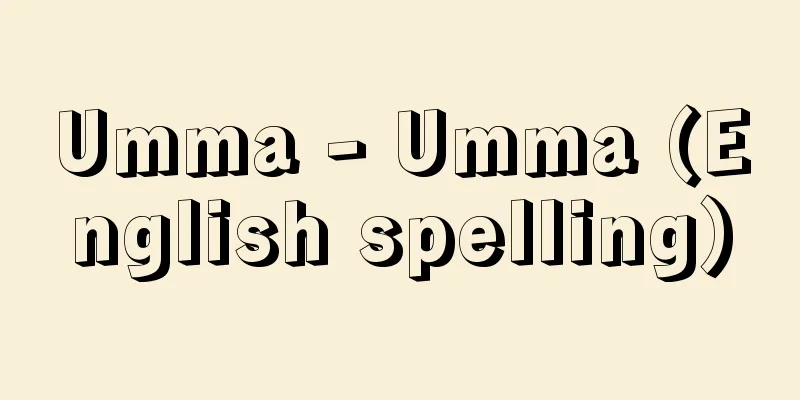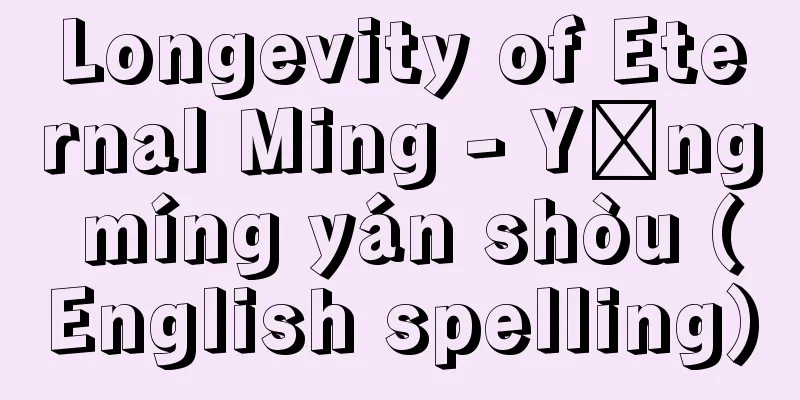Umma - Umma (English spelling)

|
The Islamic faith community, or "Islamic community." In modern Arabic, it is also used to mean "nation" or "nation." In the Quran, it was first used to refer to the unit group to which God sent messengers (prophets) to convey messages in the history of human salvation, but later it came to refer exclusively to "Muhammad's Ummah," the Islamic community. It started out as a blessed community that correctly preserved and practiced the word of God (the Quran), and to that extent was approved by God. This means that the members of the Ummah are obligated to make their actual community more Islamic on the one hand, and to work to promote and expand it to the outside world on the other. This is the basis of the historical development and dynamics of the Ummah. The ideal of this Ummah was later embodied as Sharia (Islamic law). Just as the Sharia is a comprehensive code of conduct for the daily life of humans, the Ummah is not merely a "spiritual" unity of humans, but is in fact a living community that shares the code of conduct for daily life, and is thus closely bound together. For this reason, religious conflicts immediately become political conflicts, and political disputes become religious issues. The Ummah, by its very nature, always aspires to be a nation, but it was not until the first century of the Abbasid Caliphate (750-1258) that the ideal of a single, multi-ethnic Ummah governed under one law was realized. After that, the Ummah was politically divided, and today it is divided into ethnic nations, and the unity of the Ummah has become a distant dream, but it still appeals to Muslims as an ideal linked to the glory of the past. [Nakamura Hirojiro] Source: Shogakukan Encyclopedia Nipponica About Encyclopedia Nipponica Information | Legend |
|
イスラム教の信仰共同体、つまり「イスラム共同体」のこと。現代アラビア語では「民族」「国家」の意にも用いられる。コーランでは、最初、神が人類救済の歴史のなかで使徒(預言者)を遣わし、使信を伝えさせるその単位集団として用いられていたが、のちにはもっぱら「ムハンマド(マホメット)のウンマ」、すなわちイスラムの共同体をさすようになる。それは、神のことば(コーラン)を正しく保持して実践し、その限りにおいて神のよしとする祝福された共同体として出発した。このことは、ウンマの成員が、一方ではその現実の共同体をよりいっそうイスラム的にし、他方ではそれを外に向かって宣揚し拡大するために努力する義務を負っていることを意味する。これがウンマの歴史的展開とその動態の基底にあるものである。このウンマの理想はのちにシャリーア(イスラム法)として具体化される。このシャリーアが人間の日常生活の包括的規範であるように、ウンマは人間の「霊的」結合体にとどまらず、現実には日常の生活規範をも共有する生活共同体であるだけに、その結合は密である。それだけに宗教的対立はただちに政治的対立となり、政治的争いが宗教の問題となる。ウンマはその性質上つねに国家を志向するが、1人のカリフが一つの法の下に統治する多民族的単一国家のウンマがほぼ理想に近い形で実現したのは、アッバース朝(750~1258)の最初の1世紀までである。その後は政治的に分裂し、今日では民族国家に分かれ、ウンマの統一は遠い昔の夢となってしまったが、それが過去の栄光と結び付いた理想としてムスリム(イスラム教徒)に訴える力は大きい。 [中村廣治郎] 出典 小学館 日本大百科全書(ニッポニカ)日本大百科全書(ニッポニカ)について 情報 | 凡例 |
>>: Cloud Dream - Unbou (English spelling) Yun meng
Recommend
pilgrim
…The original meaning of the Latin word peregrinu...
creole
…Many researchers have failed to find a connectio...
Guinea [Region] (English name)
The name given by Western Europeans to the west co...
Ashikubo tea - Ashikubocha
〘Name〙 A tea with excellent aroma produced near As...
Reichardt, JF
…Finally, at the end of the 18th century, songs b...
American
...In April 1901, the paper, which had been fierc...
Psaltriparus minimus
…The Red-tailed Tit A. concinnus is found in the ...
Basic Personality
...This is an introduction to the study of nation...
Kamoan, C.
… The formation of the group and its techniques b...
Beers (English spelling) Clifford Whittingham Beers
1876‐1943 American mental health activist. Born in...
Afro Shirazi Party
… On the other hand, Zanzibar achieved independen...
Ishimura Kyoko
...A performer of the Chikuzen biwa. His real nam...
Tachometer
…A tachometer is an instrument that usually measu...
Hypericum - Otogirisou
A perennial plant of the family Hypericaceae (APG...
Canon Law - Canon Law
Canon law refers specifically to the canon law ena...









